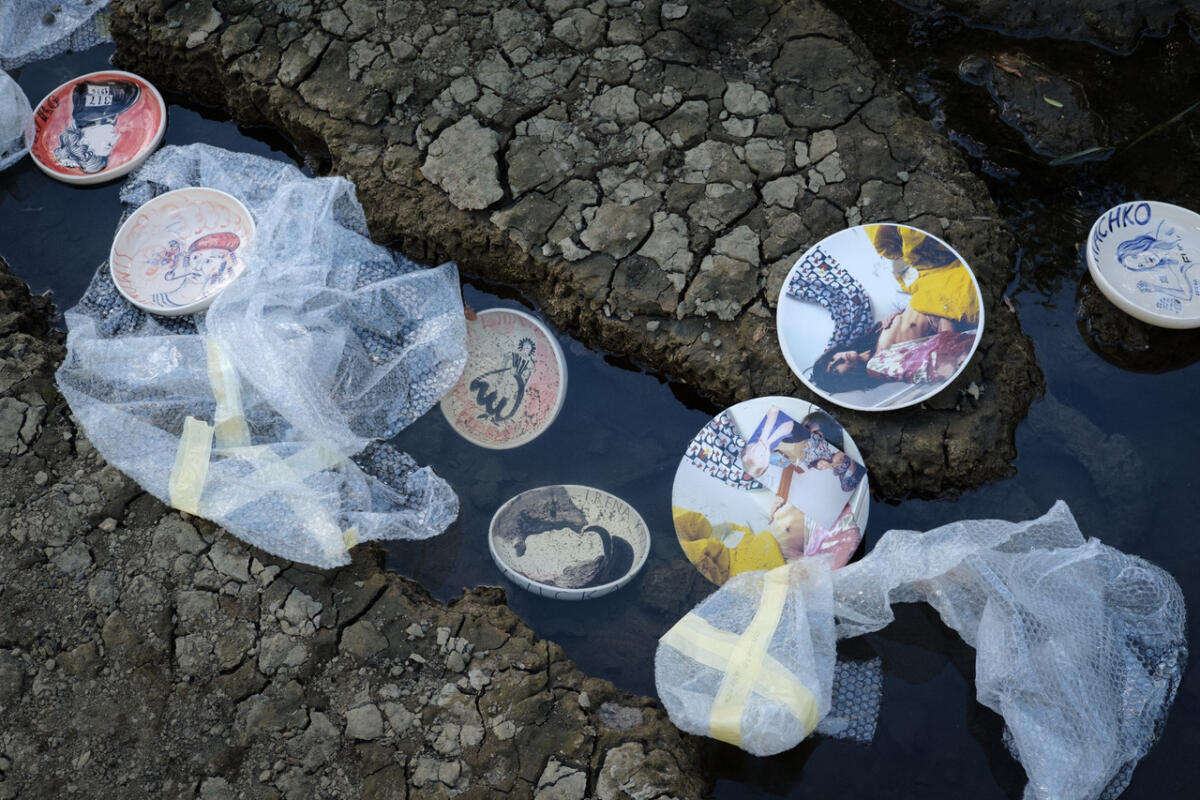
The team at BLOK would like to thank the Author for her permission to republish her essay on Anna Baumgart’s work. The full text can be read in Basia Śliwińska’s, “Feminist Visual Activism and the Body” published by Routledge, New York (https://www.routledge.com/Feminist-Visual-Activism-and-the-Body/Sliwinska/p/book/9780367693374). BLOK would also like to thank the Artist for her generous help and providing us with the visual material.
One of Baumgart’s recent projects, “Table for Women” (“Stół kobiet”), realised in the Museum Nałkowskich in Wołomin, may be accessed at: http://muzeumnalkowskich.pl/stolkobiet/.
In her performative installation Sprawa kobieca w Polsce. Łódź 2018 (The Woman Question in Poland. Łódź 2018), staged 8 September 2018 in Teatr Nowy im. Kazimierza Dejmka (Kazimierz Dejmek New Theatre) in Łódź, Poland, Anna Baumgart, a Polish multimedia artist, explored inequality in women’s visibility and the absence and/or silencing of their voices in debates across socio-political infrastructures in Poland. This para-artistic work, reimagining the 1989 Round Table talks precipitating Poland’s shift to democracy, initiated a series of evolving performative debates[2], driven by the same parameters. Each time a few women, carefully selected by the artist, are asked to invite guests to participate in a roundtable debate concerning women’s invisibility in Polish history and the post-1989 democracy. The project is site-responsive, inscribed and contextualised with/in local histories not only via historical references but also through performative interventions, which some guests are invited to prepare prior to the event. Three registers condition ways in which one can experience the project—synchronous debating (participating in the performative installation); synchronous listening (the audience); and asynchronous engagement (accessing the recordings and photographs of the event afterwards). I want to suggest here a fourth register—para-chronous participation—affirming the position I am taking in this text; being nearby, alongside, across and in proximity; leaving the space of representation and acknowledging the gap between myself and the event while speaking with the debate initiated by Baumgart, her hosts and guests. I do not intend to speak for the artist or participants. Para-chronous positioning, by its proximate distancing, leaves a possibility of others entering and joining the conversation, filling the gaps or opening them wider. This text extends the invitation to join the debate, which, as I argue, embodies emergent and budding activism founded upon solidarity and agential collectivity.

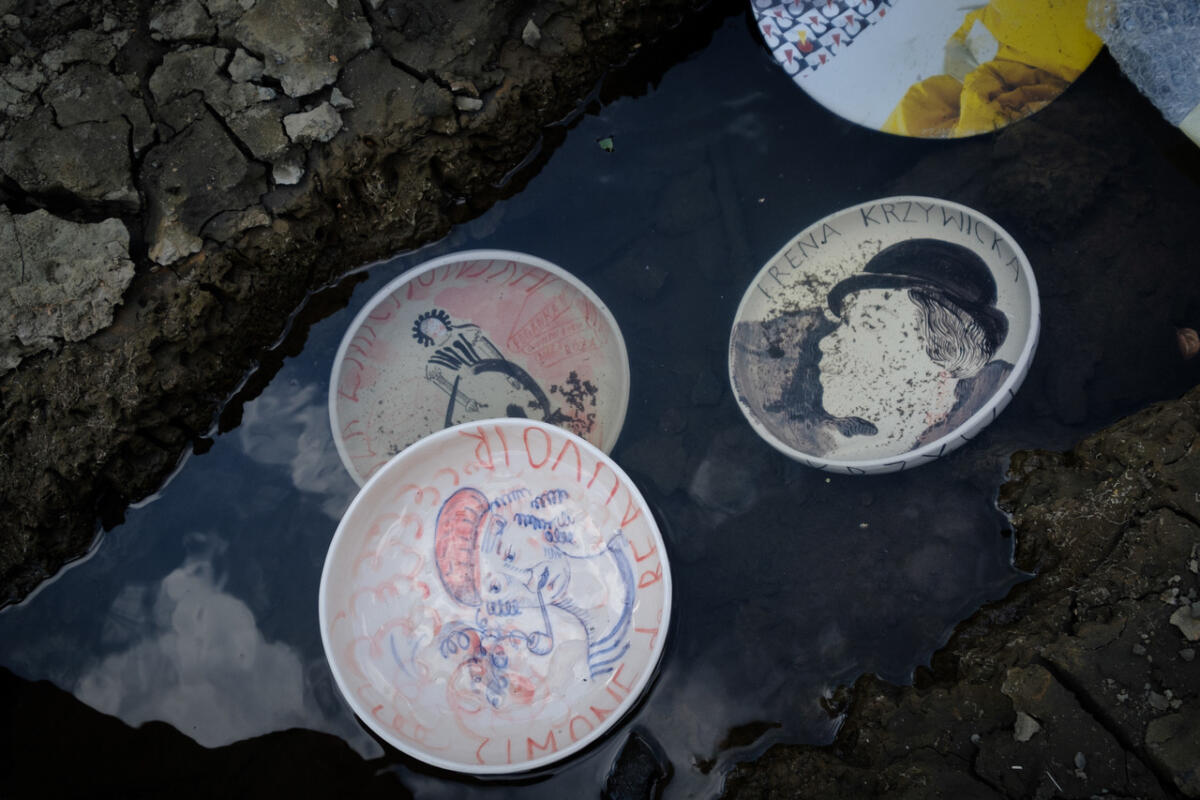


I imagine the space of Teatr Nowy in Łódź. First, when the audience enters to take their seats in the theatre stalls, the main stage is dark. The lights are dimmed. No one knows what to expect. The lights come on; at first gently stroking the front of the stage and making visible a table made from cardboard with place settings—each accentuated with a plate and a glass. Then, over 50 guests come in, most of them wearing red balaclavas. They sit. At the beginning of this performative event a short video installation is screened, in which actresses Klara Bielawka and Anna Kłos read a poem, Girls are coming out of the woods (2018), by Indian poet Tishani Doshi:
Girls are coming out of the woods,
wrapped in cloaks and hoods,
carrying iron bars and candles
and a multitude of scars . . .
Is the world speaking too?[3]
Baumgart asks the world to speak.
***
In October 2016, for the first time in Polish history, and at an unprecedented scale, approximately 120,000 women united in public demonstrations across Poland to protest against a further tightening of an already extremely restrictive anti-abortion law proposed by the Polish government. Since the 2016 protests, numerous visual interventions and artistic actions in Poland have been preoccupied with the violation of women’s rights and women’s invisibility and un-presences in the Polish public sphere and history, or rather his-story. Artistic practice with a social purpose engages with visual politics but also has the potential to intervene in everyday politics to resist and transform existing socio-political configurations. This brings in new modalities based on feminist politics that expand how we see the world, visibilising what the dominant consensus has obliterated and obscured. Dimitris Papadopoulos talks about ‘alternative imaginaries’ and practices to contest power otherwise than via organised protests[4]. Papadopoulos’ ‘alter-ontological organizing’ is ‘more-than-social-movements’ relying on small scale-actions, cross-national networks, and localised, site-responsive micro-politics. Artistic practice offers such ‘alter-ontological organizing’, strategising and developing new pathways, participative and communal, for action to re-present and embody women’s experiences in the world.

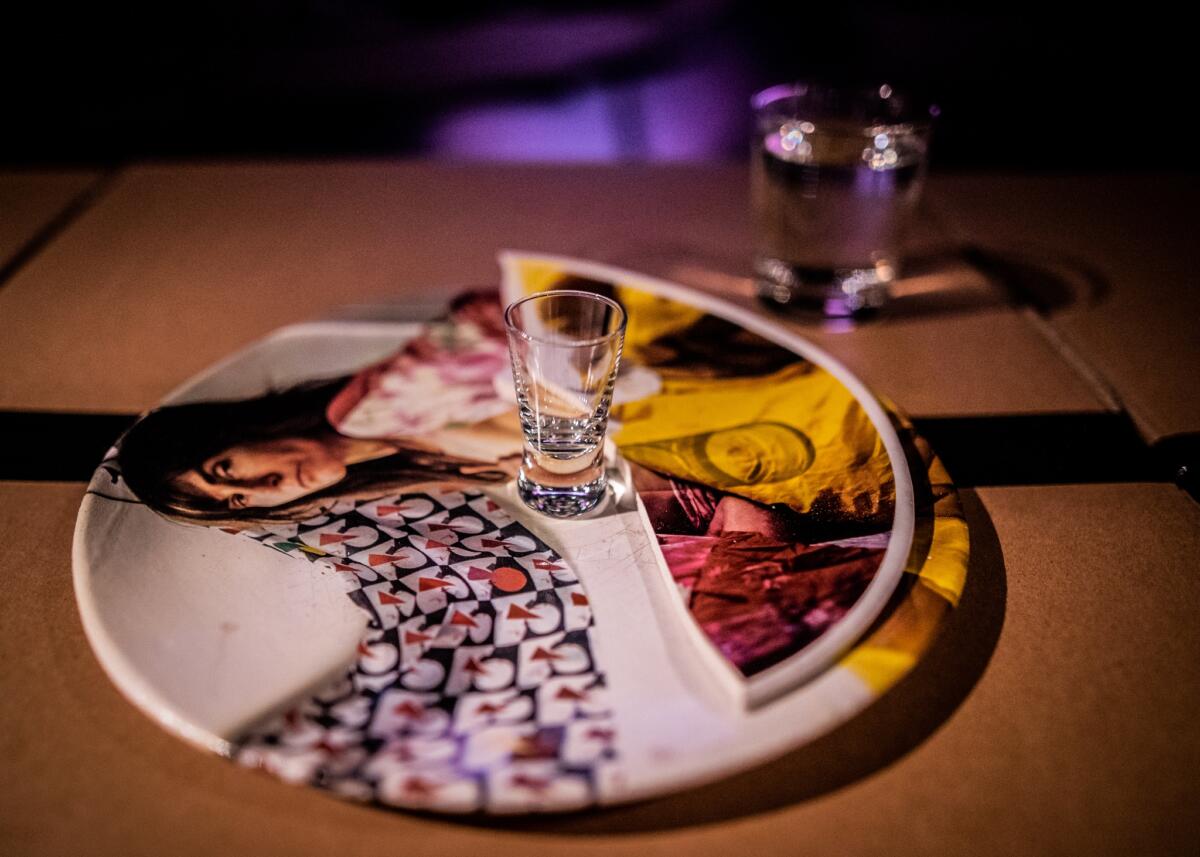
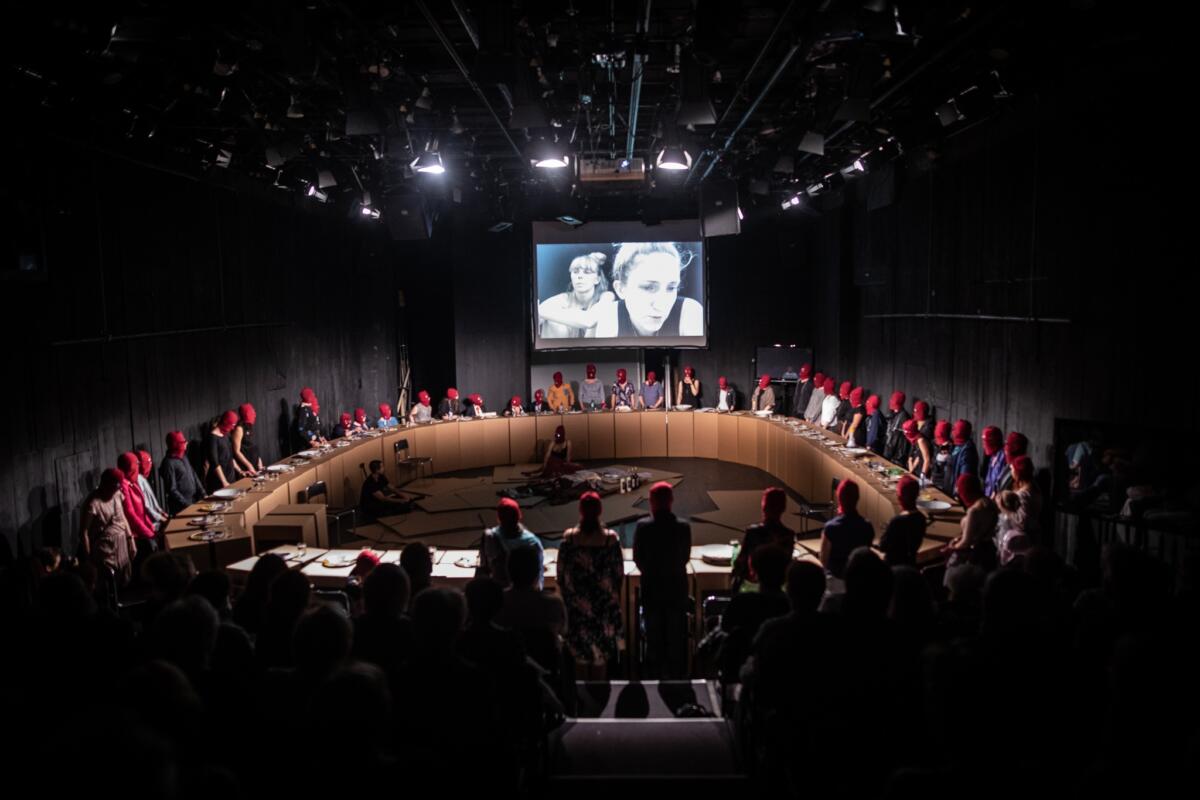


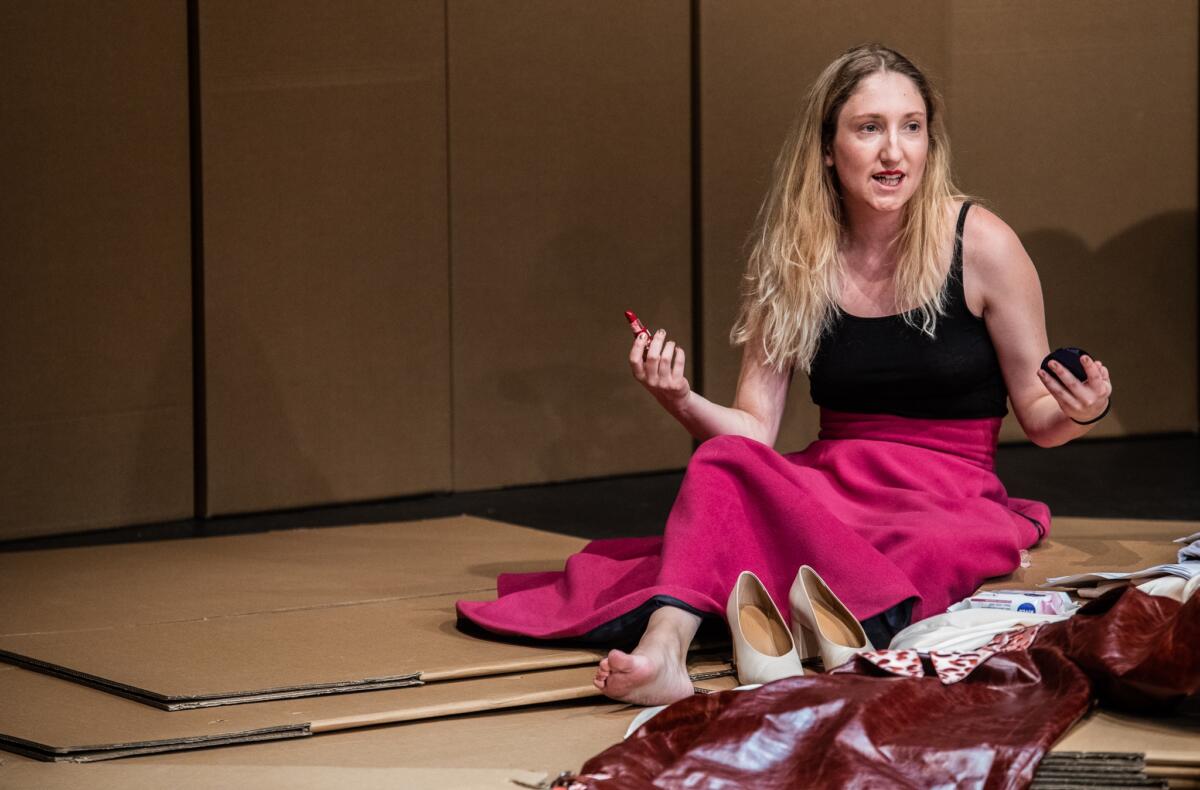
This essay works through Baumgart’s Sprawa kobieca w Polsce. Łódź 2018, which, by creating a repository of micro-narratives, amplifies women’s voices with/in her-stories and suggests activism that is budding, patient, persistent and insistent in its repetition rather than salient, militant, aggressive, anarchist and revolting. Baumgart’s work is a collaborative act, not an object, as is the activism she encourages based on politics of solidarity. This means those participating in the project synchronously and asynchronously but also para-chronously, like myself, stand alongside it, talk with it and through it. Baumgart’s art offers a performative and discursive space for persistence embodied with/in emergent and continuous activism. This essay reflects on Baumgart’s project creating another micro-narrative, my-her-our story of an embodied feminist visual activism. Her-stories are explored, focusing on politics of solidarity, togetherness and feminist corporeal-materialism.
*** Her-Stories
Baumgart’s project re-performs the Round Table talks first held on 6 February 1989 in the Council of Ministers Office in Warsaw, Poland, between Solidarność (Solidarity), the opposition faction, and the ruling communist government, at which only two women were present: Grażyna Staniszewska (pro-opposition) and Anna Przecławska (pro-government). The Round Table sessions radically altered the Polish government and social tissue, precipitating the unravelling of the communist bloc and paving the way to a free and democratic Poland. It was a transformative moment in Polish history. However, Joanna Mishtal[5], argues that Poland has never regained its sovereignty, as the ‘red’ regime has been replaced by the ‘black’ one (a reference to priests’ cassocks). The 1993 Concordat signed between the Polish state, its episcopate, and the Vatican, not only expanded the Catholic Church’s privileges but also undermined Polish political independence. Women’s rights were the first to be sacrificed by the Left at the expense of good relations with the Church: 1989 was a moment of freedom but also the shackling of women.

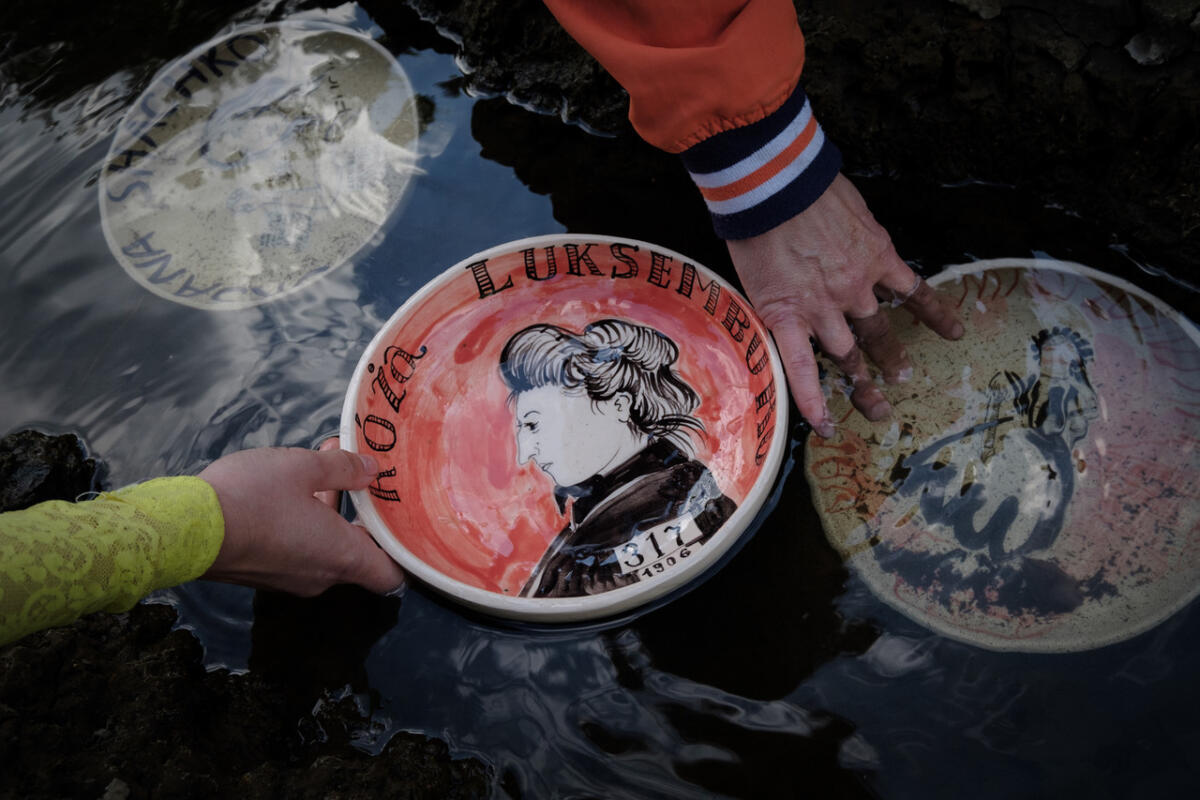
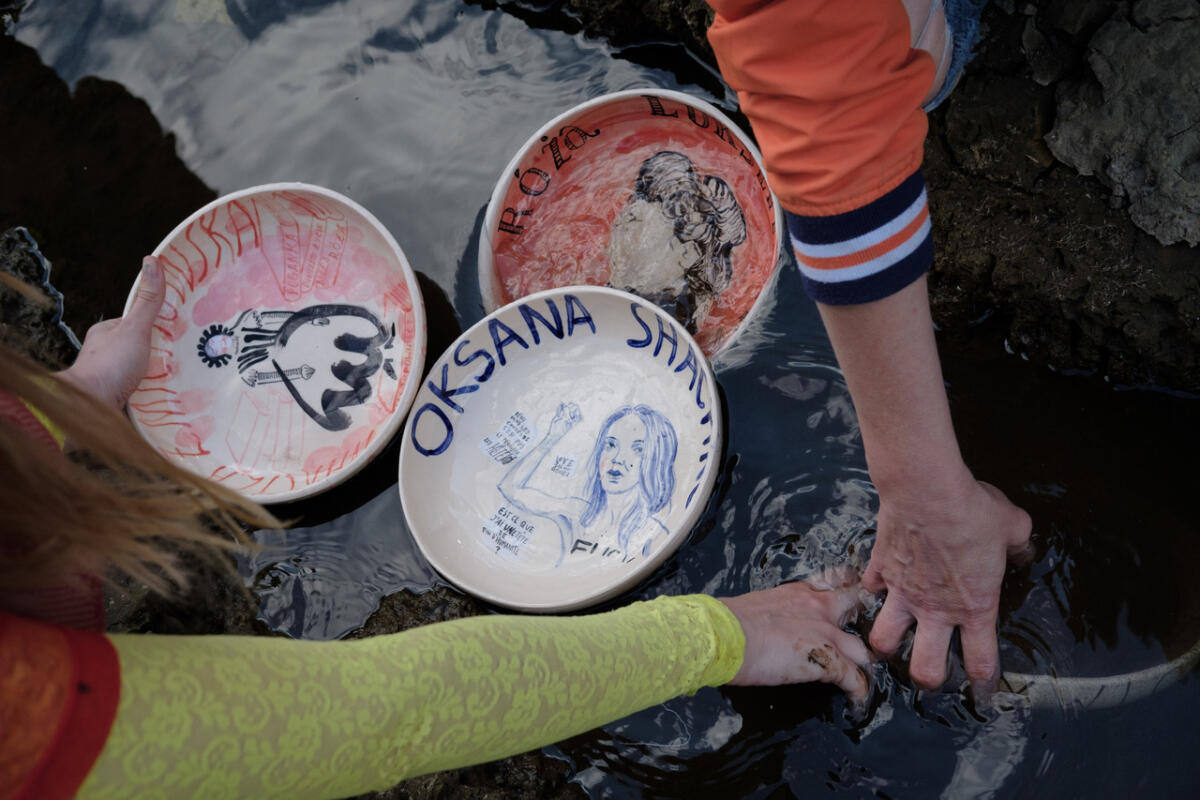
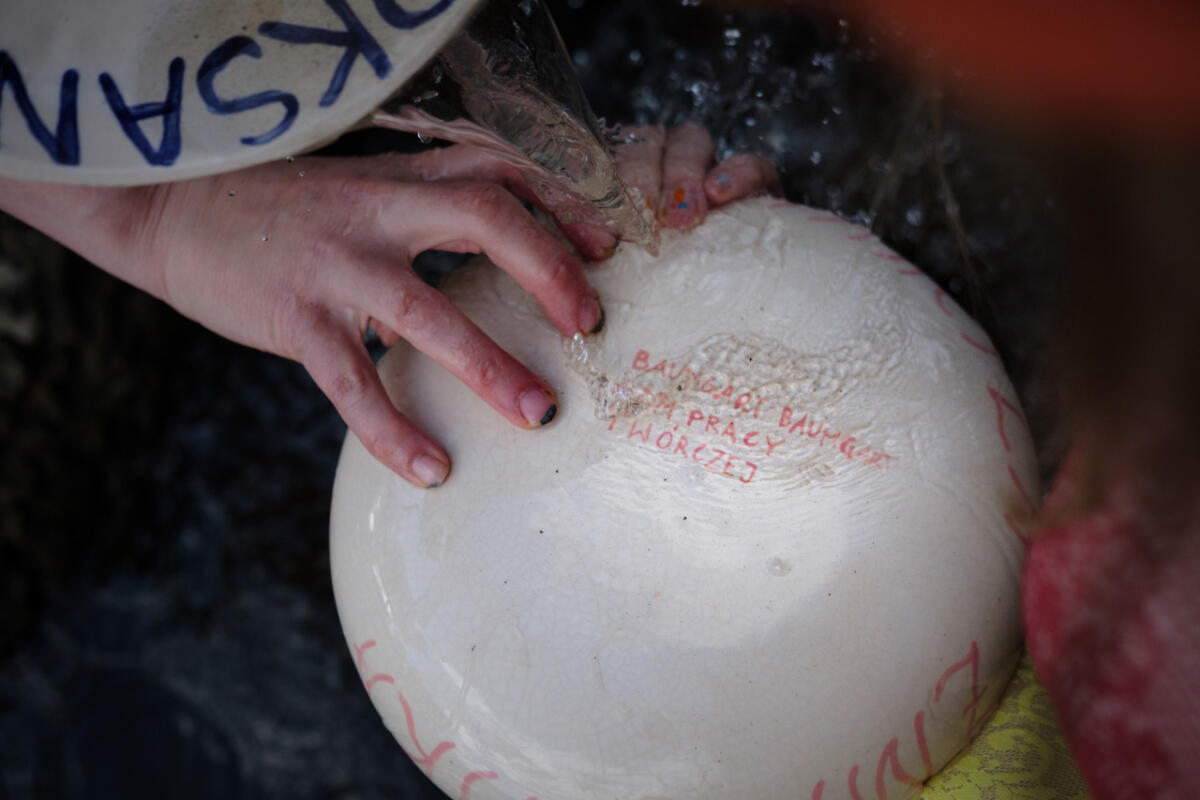
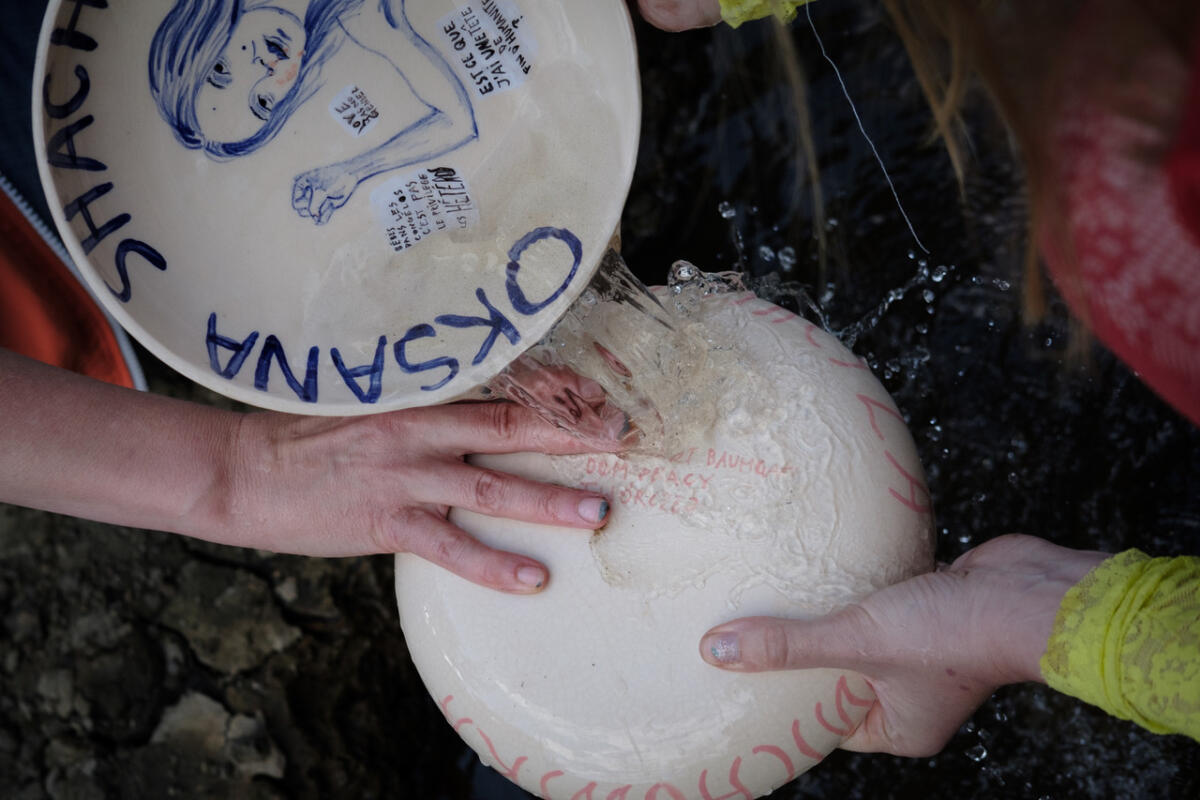
Sprawa kobieca w Polsce. Łódź 2018 initiated a series of ongoing, collective, embodied debates to tell and make her-stories via a collective subject. The project reverses the gender ratio of the talks, inviting 50 women and 2 men—among them activists, artists, social workers, and researchers—to debate issues faced by women in post-1989 Poland and to reflect on the inequality in women’s visibility revealed by the Round Table talks. The title of the work acknowledges Klub Polityczny Kobiet Postępowych (KPKP; Progressive Women’s Political Club), an often-forgotten Polish feminist organisation founded in May 1919, which contributed to the Conference of the International Woman Alliance Suffrage in Geneva in June 1920 with a report entitled ‘O Stanie Sprawy Kobiecej w Polsce’ (Concerning the Woman Question in Poland).
For the project in Łódź, the artist created a table made from cardboard—a material often signifying homelessness but also nomadism and mobility. The event began with a screened reading of Doshi’s poem, followed by a number of invited performative interventions by women. After those initial creative reflections, those sat at the table started debating the invisibility of women in Polish history. The proceedings, led by Agata Araszkiewicz, were interwoven with earlier prepared talks by some participants, who shared their own stories. The purpose was to select 50 female candidates to visibilise in her-stories and thus amplify voices of women. Afterwards, in an online vote, 12 women were chosen as heroines in Polish history. Baumgart plans on honouring them by creating their portraits on the plates served at subsequent debates.
Participants of the roundtable wore red balaclavas, prepared by the artists, embroidered with synthetic gemstones—a symbolic gesture, as Baumgart explained to me, referencing women’s protests in Spain and Latin America in spring 2018 against gender violence. The use of masks is a strategy adopted by activist artistic and guerrilla groups.
Baumgart’s performative gesture embodies resistance against masculinist discursive tactics and patriarchal discourse excluding women from public presence. It is a call, first, to claim women’s agency and their recognition as subjects at the limits of recognisability, governed and policed by patriarchal collective memory; and second, to visibilise asymmetries of the field of appearance. The project can be read alongside Rosi Braidotti’s argument concerning the commercialisation and metaphorisation of women and, in extension, the trivialisation of feminist arguments. Valorisation of women’s bodies validates these based on the principle of visual pleasure. Braidotti writes:
the celebration of femininity reduced to metaphors of the void, lack, non-being, the valorization of woman as textual body, rather than female-sexed body, hides one of the most formidable types of discrimination exercised against women in recent years. What is missing from these ‘becomings’ are women, not only as a revolutionary political movement, but also as flesh-and-blood human beings, engaged for personal reasons in a collective process of subversion of the images and status of women[6]This void and non-being, a metaphor for active negation against the widespread relegation of women to passive and silent positions, is confronted by Baumgart. The narration of the event allowed all individuals sitting at the table to engage with and actively re-construct Polish history and women’s contributions to the country’s transformation. Each iteration of the performance is ephemeral, but their staging in different sites reconstructs her-story making and telling. Different participants are invited to each debate, which makes her-story evolve into a budding structure independent from the artist—narrativised by the participants’ micro-narratives and stories of own experiences. Shared stories speak with each other, creating an interconnected agential collective emerging together in solidarity. This emergence is where Baumgart’s activism happens. The intention behind inviting other people’s voices is to act against invisibility, which can be read alongside Nicholas Mirzoeff’s concept of the ‘space of appearance, where you and I can appear to each other and create a politics… To appear is to matter’[7]. Baumgart’s practice is founded upon participation of different groups of people from different socio-economic backgrounds. Each project takes place in specific spaces loaded with histories, inequalities and invisibilities. The event in Łódź is underpinned by activism that is emergent and continues through repetition, enfolding iterations into the project. Gradual and granular rather than aggressive, it is pernicious, insistent and persistent. Baumgart’s activism is a collaborative act, adopting politics of solidarity and demanding the right to be seen and heard while we stand alongside each other, foregrounding horizontal relationships and forming a space of appearance coalesced into a common.
The interconnected and interdependent character of the installation acknowledges and references two feminist artworks, The Dinner Table (1974–1979) by Judy Chicago and The Famous Women Dinner Service (1932–1934) by Vanessa Bell and Duncan Grant, exposing male-centric paradigms of nationalist history but also creating a feminist archive as a source for recording her-stories. Baumgart’s work is budding; one project turns into another: evolving, returning and extending. Budding, a particular feminist organising structure, is processually oriented. It is an archetype of gradual development, forming new life through maternal relationship of care. New organisms develop from the parent organism, allowing both to grow together. The principle of budding and cohabitation is highlighted in the iterative nature of Baumgart’s multi-layered work. Past, present, and future tropes and figures permeate and graft a growth bud, enabling dialogic relationships.
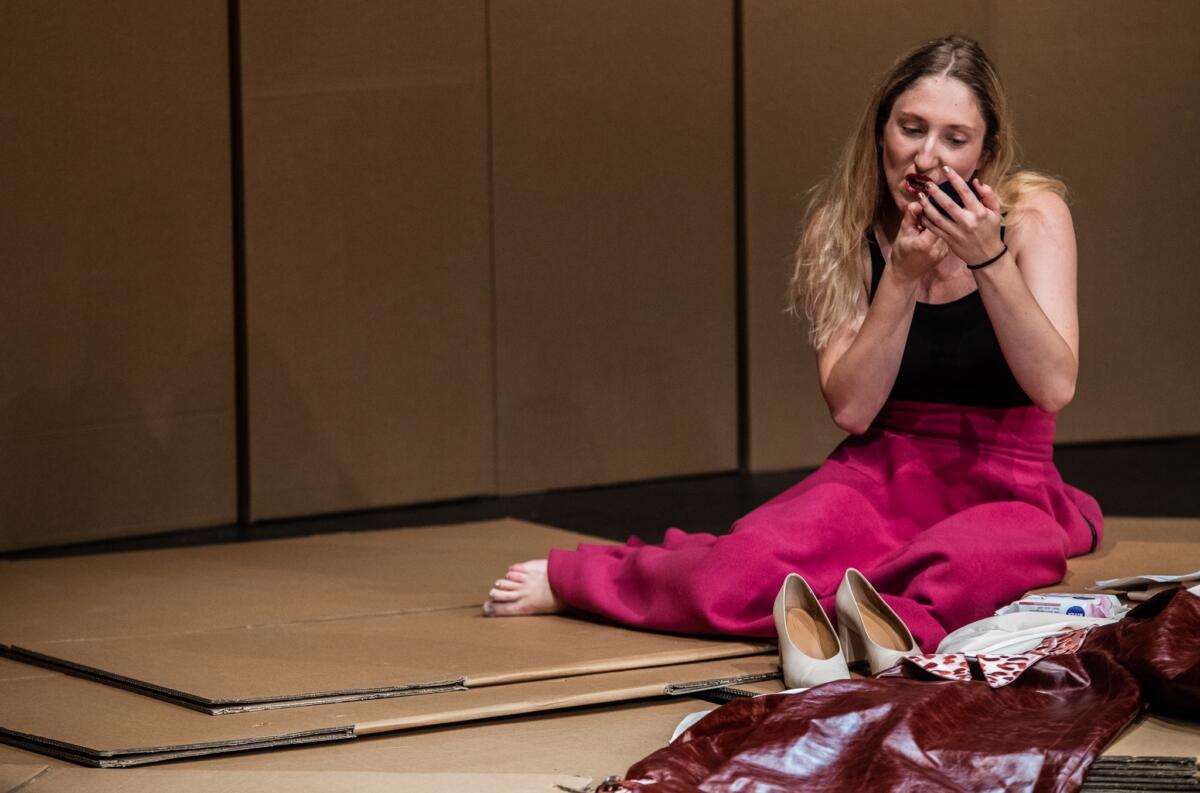
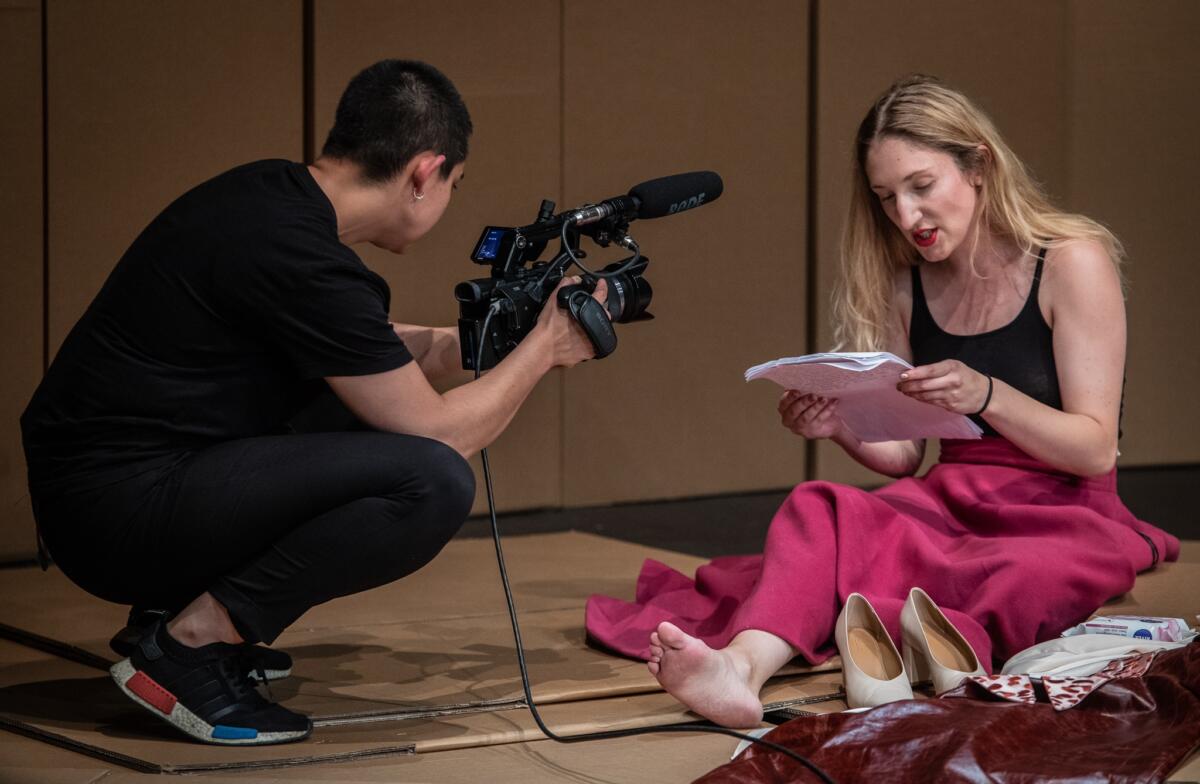
*** Politics of Togetherness and Solidarity
Solidarity means we act together as a collective subject situated beyond first-person modality. It is a gathering enacted by and of bodies signifying persistence and resistance, as Judith Butler[8]. Our acting in concert, interdependency and collective responsibility collapses singular narratives that perpetuate precariousness and vulnerabilities of each ‘I’. Solidarity defines this mutual dependency, which affirms an embodied and plural performativity and our demand for ‘liveable lives’, as founded upon an egalitarian social and political order. Baumgart’s site-responsive project emphasises the solidarity of a collective fight for a shared cause and the importance of narratives that are localised and site specific. For example, in Łódź, the artist reaches out to histories, embedded in the tissue of the city, that acknowledge women’s contribution to the cultural and socio-economic fabric. In June 1905 women actively participated in the Łódź Uprising, one of the most prominent revolutionary fights against the Russian Empire. In February 1971 textile workers in the city, in majority women, began a strike action to demand democratic changes concerning low wages, rising food prices and water shortages. A decade later, a widespread economic crisis and food shortages in Poland led to several hunger demonstrations, with the largest in Łódź on 30 July 1981. The residents held banners that stated, for example, ‘We want to split bread, not Poland’. Baumgart strategically left the plates on the table empty to reference the strikes and local history of food insecurity. She wants participants to belong to local communities, which foreground local urgencies and connections. The spatiality of the project allows those localities to travel outside of the singular event, which means that the local is established in circuitry that exceeds it, spreading through communities and emergent networks. The para-chronous participation makes it possible to summon and sustain those urgencies in an ongoing debate happening in proximity and adjacency open to others to join in. Baumgart told me that the structure of the debates is founded upon horizontal feminism. Horizontal conditioning enables us to see and hear each other and invent one another in a dialogic imagination.
Baumgart confronts women’s invisibility and lack of equal rights in post-1989 Poland, signalling a crisis. By enabling a collective debate, she also opens up space within which women are re-presented and present themselves, and forms Mirzoeff’s ‘space of appearance’[9]. He argues that ‘the space of appearance, [is] where you and I can appear to each other and create a politics’[10]. Similarly, Baumgart offers a space in which being together, in solidarity, reconstitutes plural forms of agency and social practices of resistance, enabling equivocating relations between ‘I’ and ‘you’ and ‘we’, an equal living in space. Baumgart’s collective, orchestrated around the table, offers a prospect of substantive democracy, which could also be positioned in parallel with Judith Butler’s notion of the assembly[11], the power of people to gather together.
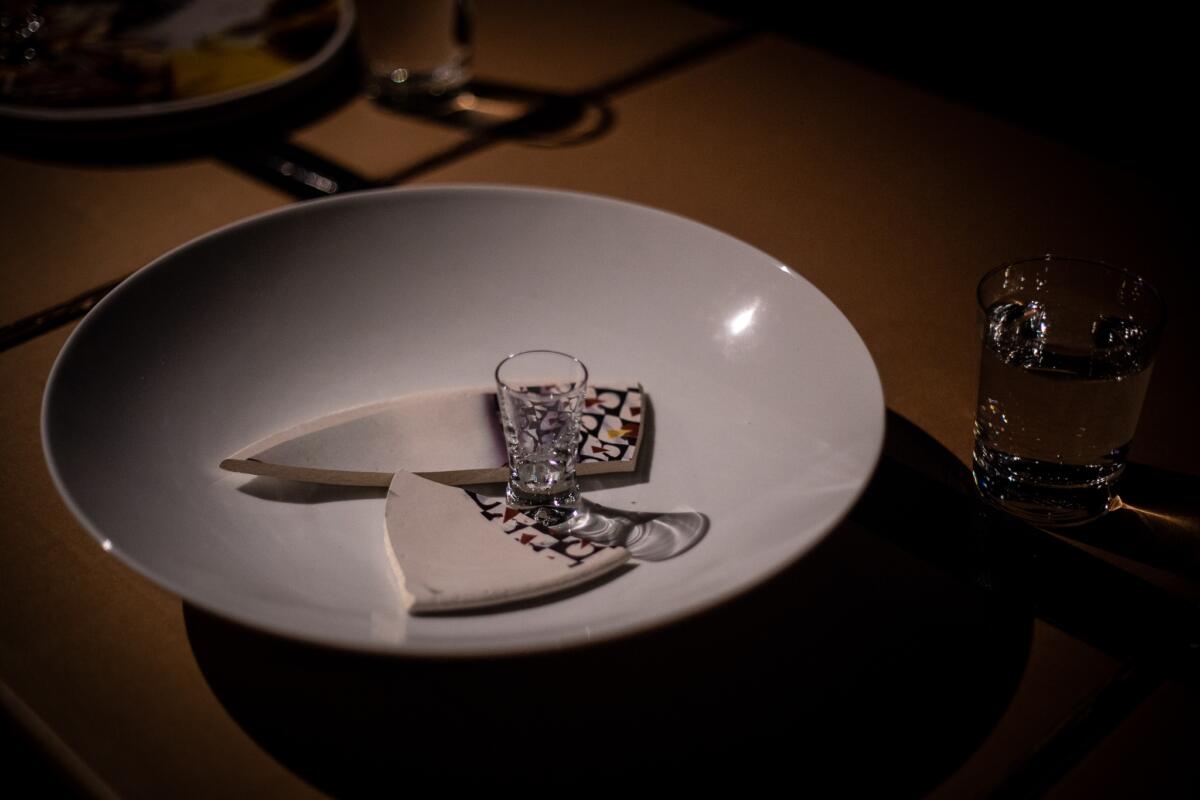


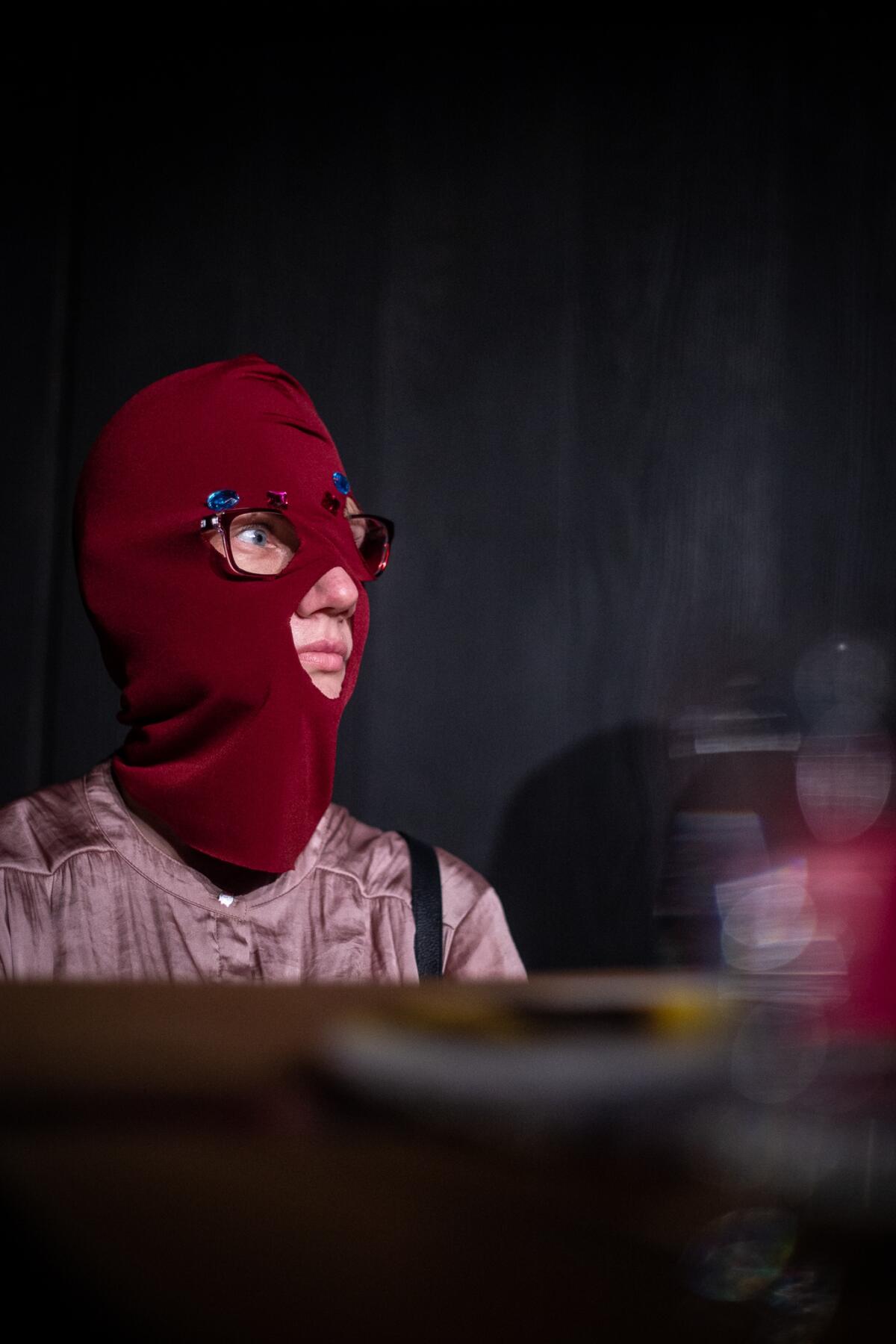
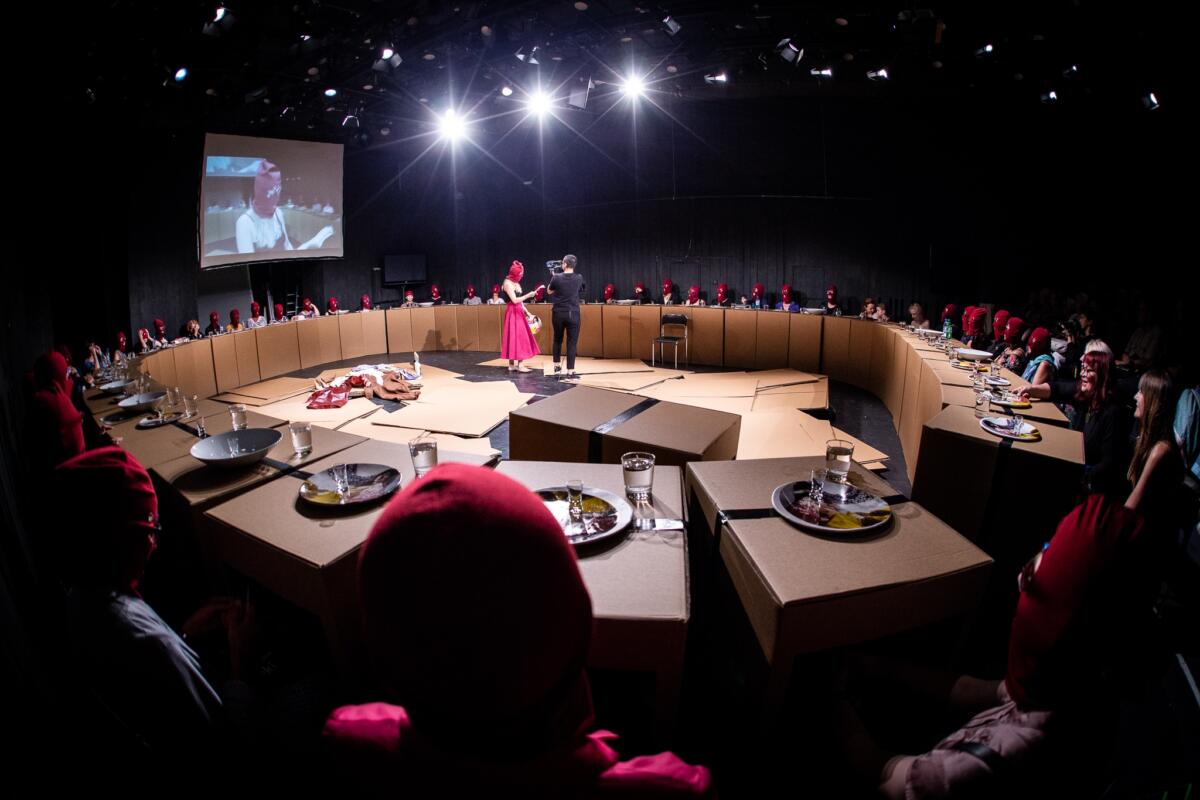
*** Feminist Corporeal-Materialism
Araszkiewicz’s text, entitled ‘Fangs’[12], opened the event. She starts: ‘I would like to be visible, audible materially’. Baumgart references artistic practices of her own and of others. The installation itself is built on and from interventions penetrating, extending, and expanding each other. For example, the text by Bojarska was written for Baumgart’s work Symfonia Syren (Mermaids’ Symphony, 2017, Museum of Sopot). When Baumgart was travelling to Sopot to perform Symfonia Syren, her lung punctured. This was a moment, she recalls, when she realised that the body needs to be reclaimed from the avant-garde and that this can only be done collectively.
Araszkiewicz’s welcome speech ended with a call to raise a toast with white and black milk prepared by Wojtek Radtke, a Polish artist from Gdańsk. Baumgart told me that she envisaged the event as a proper feast to treat her guests. With empty plates referencing hunger strikes in Łódź, she wanted to offer a drink. The white milk connotes ‘white stains’ or ‘white ink’, the invisible history of Polish women[13]. Black milk references Elif Safak’s book Black Milk, published in 2007, symbolising the subordination and invisibility of reproductive and affective female labour. As a feminist metaphor, milk also references Hélène Cixous feminine writing, with white ink connoting invisibility[14]. Baumgart reminds us of the unwritten and/or unseen history of women, their affective and reproductive labour and unacknowledged (and usually unpaid or underpaid) contribution to society and culture. Baumgart’s embodied action could be read alongside Marsha Meskimmon’s notion of ‘vital feminist corporeal-materialism’, signalling ‘a deeply ethical and political entanglement with/in world’[15]. Baumgart carefully choreographs her performative installations, and it is noteworthy that the one in Łódź happened in the space of a theatre, on stage. Meskimmon’s ‘corporeal‐materialist aesthetics’ becomes a strategy to materialise the embodied self with/in the world beyond representation. Baumgart choreographs activism, translating street politics into a para-artistic project that turns the social and political demands of a women’s movement into dissident ethics. Her curated debates embody and materialise a collective subject with/in an embodied revolution.
Baumgart, Araszkiewicz, and other women and men who assemble at the table ask the world to speak the feminine. I approach the project as an active solidarity campaign, building alliances in our democratic struggle to appear and be present as women, as citizens. Exclusions that have become non-representative and naturalised in Poland are confronted and opened not only to consider relations of power that have structured them but also to demonstrate that, as argued by Butler[16], it matters when bodies assemble as relationships connect: ‘a politics of alliance’ requires ‘an ethics of cohabitation’. Butler emphasises the importance and urgency of ‘a concerted bodily enactment’[17]. Baumgart creates such an opportunity for a coordinated action, reconstituting plural forms of agency and initiating a social action ‘in concert’—with/in I and we—of resistance. The event uses strategies of visual disruption embodied with/in gestures of dissatisfaction with the male-centred vision and version of his-story and continued disregard for women’s presences and rights.
***
With her ongoing project, Baumgart invites predominantly women to debate issues that were neglected or silenced in the original 1989 Round Table talks because women were largely uninvited. She recounted that the project was budding within her; first her body literally signalled the need for an embodied revolution when her lung was punctured, and then the 2016 Black Protests unravelled yet again the issue of a problematic and dangerous Polish government’s relationship with the Church, diminishing women’s rights, including sexual and reproductive rights. She considers this project a para-artistic work that mutates and evolves in response to national and local debates concerning women’s rights. This budding and the interconnectedness of the project, or in fact her artistic practice, and its participatory character allow her to break hierarchies and learn how, as she explains, to organise people. Budding, as a feminist organising structure, forms new lives. As a strategy in Baumgart’s work, it builds an agential collective. It enables space of appearance which does not reproduce hierarchical structures based on patriarchal discursive tactics and which is not exercised through a play of images and representations. It is a space of togetherness with/in which activism happens alongside or nearby art, as she told me. This emergent and budding activism, enacted in proximity alongside each other, evolves through repetition in each iteration of the project. It is a pernicious and persistent collaborative act grounded in solidarity. It demands visibility for women and human rights, for all people at all times to be treated as equally and irrevocably human.
Baumgart’s project is a form of responsible and response-able counterpower founded upon an ethos of solidarity, affirming mutual dependency and collective action beyond central narratives, at margins and frayed edges. It embodies our being in the world by opening up a debate that negotiates conditions of precarity and vulnerability and recognises the assault on women’s rights in post-1989 Poland.
This my-her-our story is about space in which we emerge as a collective subject with an agency to act with support of one another and in solidarity. Let’s.
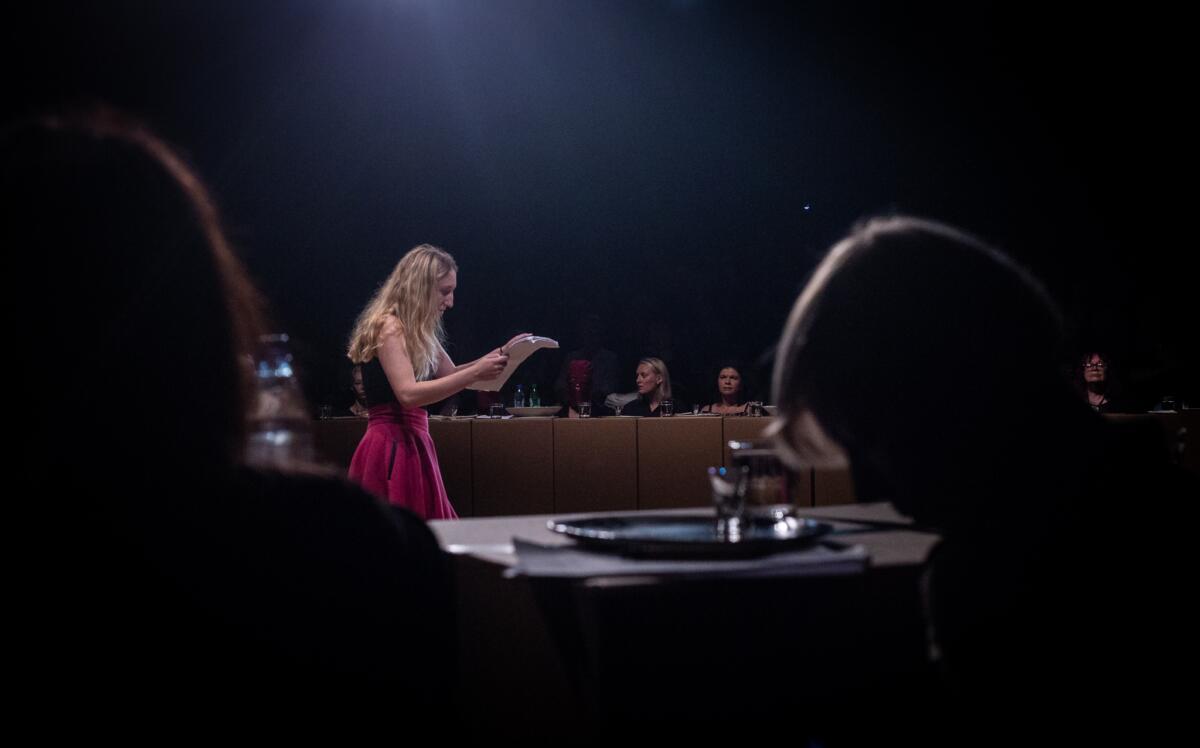
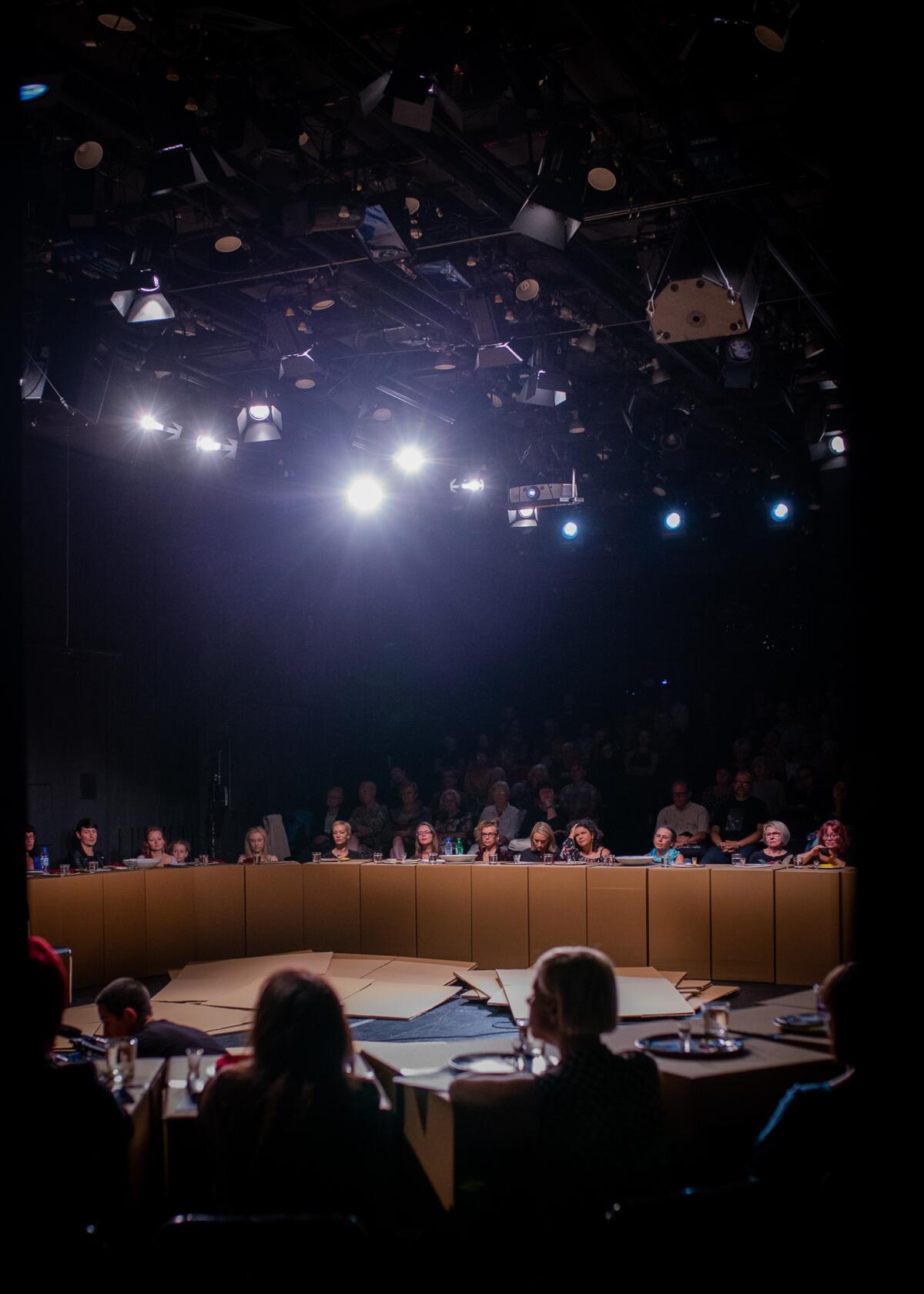
[1]The full text can be read in: Basia Śliwińska, Feminist Visual Activism and the Body, Routledge, New York 2021.
[2] The next debate was entitled Rewolucja to nie kolacja. A może jednak kolacja (A Revolution is not a Dinner, or Maybe it is a Dinner) and happened at the Galeria Miejska BWA (City Gallery BWA) in Bydgoszcz on 28 February 2019; the following, Wszyscy rozmawiają o pogodzie. My nie (Everybody talks about the Weather and we do not), was hosted by Arsenal Municipal Gallery in Poznań on 8 March 2019; and then Kolacja to nie rewolucja a może jednak (A Dinner is not a Revolution or Perhaps it is) was at Jan Tarasin Art Gallery in Kalisz on 9 December 2019.
[3] Tishani Doshi, Girls are coming out of the woods, Bloodaxe Books, Northumberland 2018); Permission courtesy of www.bloodaxebooks.com.
[4]Katy Deepwell, Feminist Art Activisms and Artivisms. Introduction, in: Katy Deepwell (ed.), Feminist Art Activisms and Artivisms, Plural Valiz, Amsterdam 2020.
[5]Joanna Mishtal, The Politics of Morality: The Church, the State, and Reproductive Rights in Postsocialist Poland, Ohio University Press, Athens 2015, pp. 17-35.
[6]Rosi Braidotti, Patterns of Dissonance. A Study of Women in Contemporary Philosophy, Polity Press, Cambridge 1991, p. 134.
[7]Mirzoeff, Nicholas, The Appearance of Black Lives Matter, available at: https://namepublications.org/item/2017/the-appearance-of-black-lives-matter/, last accessed: 18 March 2020.
[8]Judith Butler, Notes Towards a Performative Theory of Assembly, Harvard University Press, Cambridge, London 2018, p. 23.
[9]Mirzoeff, Nicholas, The Appearance of Black Lives Matter, available at: https://namepublications.org/item/2017/the-appearance-of-black-lives-matter/, last accessed: 18 March 2020.
[10] Mirzoeff, op. cit.
[11] Judith Butler, op. cit.
[12]Agata Araszkiewicz, Okrągły Stół Kobiet. O interwencji Anny Baumgart „Sprawa kobieca w Polsce 2018”’, in: Nowa Orgia Myśli, available at: http://nowaorgiamysli.pl/index.php/2019/06/05/okragly-stol-kobiet/, last accessed: 20 March 2020.
[13]Agata Araszkiewicz, op. cit.
[14]Hélène Cixous, White Ink: Interviews on Sex, Text and Politics, Routledge, New York, London 2008.
[15]Marsha Meskimmon, Art Matters: Feminist Corporeal‐Materialist Aesthetics, in: Maria Elena Buszek and Hilary Robinson (eds), A Companion to Feminist Art, Wiley-Blackwell, Hoboken 2019.
[16]Judith Butler, op. cit. pp. 68-79.
[17] Judith Butler, op. cit. p. 8.
